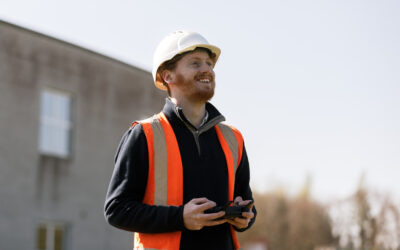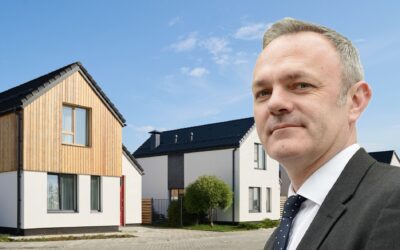CIF Director General, Hubert Fitzpatrick reflects on how partnerships and collaborative efforts will be the key to achieving success
As we look back over the key developments in the sector over 2023, it was a year when the industry began to find a steadier footing after the shocks of Covid and hyperinflation.
We welcomed Government measures to stimulate capital projects and housing, while continuing to manage the macro challenges of rising costs, labour force demands and planning delays.
Our collaborative efforts and engagement, as trusted expert stakeholders, yielded positive outcomes this year. Amendments to the public works contract
were a welcome step toward removing unsustainable risk in public projects. In housing, supplementary measures to stimulate output included the water rebate scheme and development contribution waiver scheme.
A revision of the National Planning Framework also commenced. New, innovative educational routes into construction were announced, such as the national civil engineering apprenticeship.
CIF and our members also underlined our commitment to a sustainable and efficient industry with the launch of our new ESG subcommittee and Smart Offsite Association.
The Government’s stated commitment to increased capital spending in Budget ’24 was a positive move to provide certainty within the industry around establishing a clear pipeline of work, supporting investment and growth.
Against this backdrop, our series of member sentiment surveys reflected an industry that is healthy and that holds a positive outlook for the future. This certainly echoes the views of the many members I have met across the country in my first six months as Director General.
However, the lack of infrastructure development in regional Ireland continues to frustrate our members and the communities they serve.
Likewise, while housing commencements and completions are moving in the right direction, we cannot overstate the need for greater investment in the planning system. Ireland has one of the youngest and fastest growing populations in Europe.
In 1973, the population was just three million people. It now stands at 5.2 million, a 73 per cent increase. Some 2.64 million people are in the workforce today, double that of 1996 levels.
We are experiencing huge growth and change as a nation and we critically need a built environment, including roads, schools, hospitals, utilities, housing and more, to support this.
The country needs to plan for infrastructure 20 years ahead, not just in time. In the 1990s and 2000s, key infrastructure was built in anticipation of growth, such as the M50, Dublin Port tunnel and a major upgrade to the motorway network.
Today, we must also factor in climate change and sustainability. Ireland lost a decade of investment in construction and a decade of skills in the sector post financial crash.
But we can also draw from some of the successful policy approaches of the past to plan a built environment that drives economic competition, brings tangible improvement to people’s lives and enables us to build more and build better for the benefit of the country and its future.
There is no single solution to these challenges, but we have a prime opportunity now to harness the growth the country is undergoing.
Coherent policies that grasp this potential and support deliverability and viability are critical. The construction industry welcomes partnership and is steadfast in our commitment to achieving success through collaborative efforts.
I would like to thank all of our members and the wider sector for engaging with the federation this year through our associations, branches, trainings and events.
As the representative voice of the construction industry, we look forward to moving forward in 2024 with renewed resolve to foster growth and progress, supporting your companies to succeed, so that wider society can also prosper.









